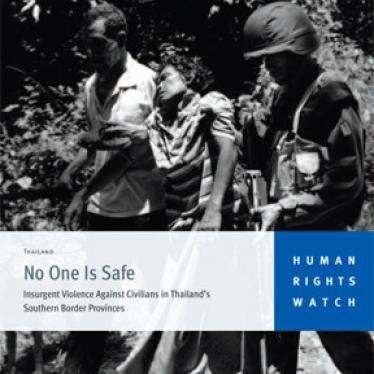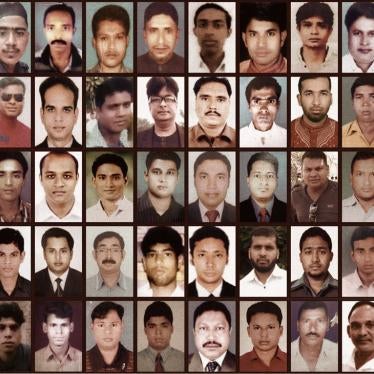(New York) - Prosecuting the soldiers who killed an imam in army detention will be a test of the administration of Thailand's new prime minister, Abhisit Vejjajiva, who has vowed to bring justice to Thailand's conflict-ridden southern border provinces, Human Rights Watch said today.
On December 25, 2008, the Narathiwat court ruled after an inquest that Imam Yapa Kaseng, a 56-year-old Muslim religious leader, was tortured and killed by soldiers while being interrogated on March 20-21, 2008, at the Army's 39th Taskforce camp in Rue Soh district, Narathiwat province. A policy statement Prime Minister Abhisit delivered to Parliament on December 30 stressed that justice will be integral to resolution of the conflict in the southern border provinces, which has claimed more than 3,500 lives since January 2004.
"The court gave a brave and unprecedented verdict in the inquest, putting its finger on torture and other abuses committed by Thai security forces," said Brad Adams, Asia director at Human Rights Watch. "This is not an isolated case of rogue soldiers, but part of a broad pattern. Now it is Prime Minister Abhisit's turn to show political courage and ensure the prosecution of the soldiers and officers who ordered and carried out the killing."
The inquest determined that the cause of Imam Yapa's death was blunt-force trauma, including rib fractures from the front, side, and back that punctured his lungs. Bruises and wounds were found all over his body, including his eyes, forehead, and lips. Imam Yapa also had long abrasion marks on his back, indicating he may have been dragged on his ankles across a hard and rough surface.
The torture and killing of Imam Yapa highlight the broader problem of ill-treatment of Muslims in army custody during operations against separatist insurgents in the south. Although every soldier in the southern border provinces carries a code-of-conduct booklet produced by the Internal Security Operations Command (ISOC), many former detainees interviewed by Human Rights Watch said that they were tortured by interrogators, including soldiers in uniform and in plain clothes, at district-level camps and at the army's main interrogation center at Ingkayuthboriharn Camp in Pattani province.
Human rights abuses have regularly occurred during the government's counterinsurgency operations since Thaksin Shinawatra, the prime minister at the time, ordered the army to use heavy-handed tactics to address attacks on army camps in 2004. Abuses escalated after the army started its "Operation Southern Defender" (Yuttakarn Pitak Daen Tai) in 2007.
Using extensive and largely unchecked powers of the Thaksin-era Executive Decree on Government Administration in Emergency Situations and the Martial Law Act, security sweeps have been carried out in the strongholds of separatist militants across the southern border provinces. These sweeps have included illegal and arbitrary detentions. Common forms of torture and other ill-treatment that have been reported are: ear-slapping, punching, kicking, beating with wooden and metal clubs, forced nudity, exposure to cold temperature, electric shock, strangulation, and suffocation with plastic bags. Lawyers and independent medical experts interviewed by Human Rights Watch have reported similar accounts.
At present, redress mechanisms in the Southern Border Provinces Administration Center (SBPAC) are unable to function independently because of interference from the army. Equally important, Human Rights Watch has pointed out that special laws that create an environment conducive to human rights violations without fear of punishment should be revoked. By using extensive powers of the Decree on Government Administration in Emergency Situations (Emergency Decree), the security forces in the southern border provinces are not subject to civil, criminal, or disciplinary liabilities arising from their actions.
"As a priority, the new government needs to overhaul the counterinsurgency strategy that encourages abuses, impose effective civilian control over the army, and provide efficient redress for victims of abuses," said Adams. "By relying on repressive measures and restrictions on fundamental human rights, Thai authorities have created a fertile ground for the insurgency to expand."
The separatist Pejuang Kemerdekaan Patani (Patani Freedom Fighters) in the loose network of Barisan Revolusi Nasional-Koordinas (National Revolution Front-Coordinate or BRN-Coordinate) have used state-sponsored abuses and heavy-handed tactics to justify their campaign of violence and terror. Although they have suffered major setbacks from security sweeps, militants still maintain their presence in hundreds of Muslim villages. According to the Thai Journalists Association and the Police Forward Command, there were more than 1,000 attacks in 2008, resulting in more than 500 civilian deaths in the southern border provinces.
"The daily situation in Thailand's south is a tragic replay of abuses and violence committed by both sides," said Adams. "The lives and rights of people are constantly at risk in this devastating conflict."







